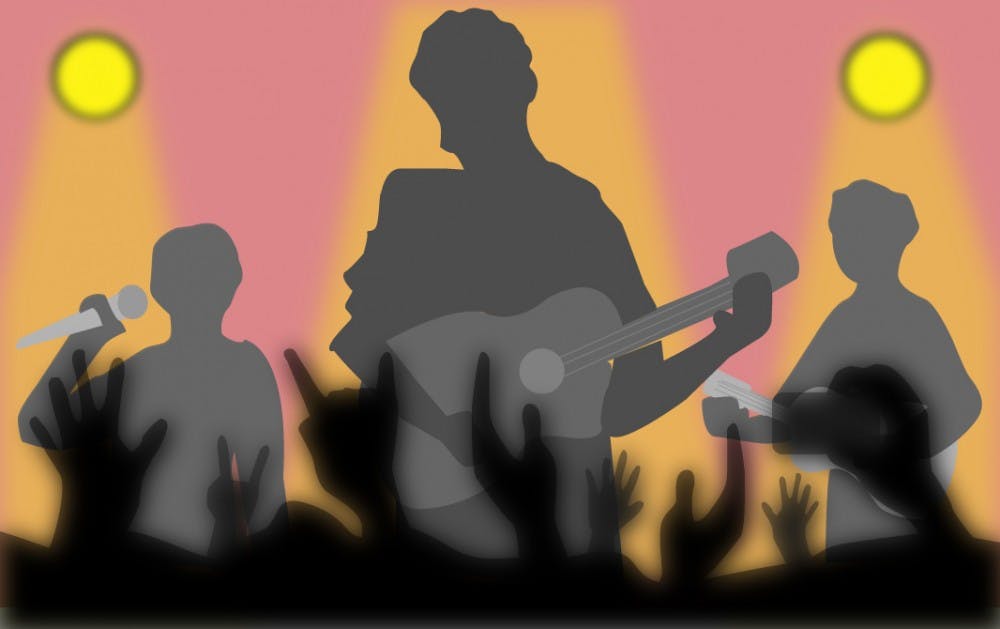At a Steve Lacy concert two years ago, a voice in the crowd screamed, "Can you say hi to my mom?"
The Grammy-winning artist replied, "Can you be quiet?"
A recording of the scene generated 1.5 million views on TikTok and millions more once reposted by other accounts. The incident became more popular than the concert itself.
As iPhones have become a way to capture everyday moments, concertgoers have changed the way they interact with both the artist and the audience. In response, venues have begun to establish their own unique expectations for concert etiquette.
Lisa Garcia, a junior studying environmental engineering, works part-time at The Van Buren in downtown Phoenix as a box office employee. For a year and a half, she has been a witness to modern concert behavior.
"Sometimes, it just feels like people are just standing there recording and on their phones rather than enjoying it," Garcia said. "When you're recording at a concert it just kind of looks like a sea of phones rather than people going up and dancing."
Ava Claus, a junior studying sustainability and English literature, explained that, as a concertgoer, she does not always agree with her own behavior.
"Sometimes I've caught myself recording videos while I'm at a concert and it's like I'm watching the concert through my phone screen and not looking around," Claus said. "I catch myself doing that and I'm like, okay, I'm not really experiencing the concert to its fullest and I'm viewing it through this filter of what's going to look good on Instagram."
When cameras are out, audiences can feel motivated toward attention-seeking behavior that wouldn't happen otherwise.
Garcia told a story of a girl who climbed the poles on the ceiling of the mezzanine of The Van Buren at a $NOT concert last year. She ended up being kicked out of the venue and banned for life.
"I feel like it was definitely to gain the attention of the crowd, like, 'Oh my god, this show is so hardcore, look what I’m doing,'" Garcia said. "Obviously she knew that people were going to record her."
This rise in rude behavior is not entirely attention-seeking, though.
"People either drinking a lot and spilling it on people nearby, or vaping, smoking, whatever, and blowing it in people's faces, that is a big one," Claus said. "Also just the shoving to get to the front, pretending that you have a friend up there and you really don't."
What goes on behind the screen is equally impactful. TikTok has changed the way people engage with artists, and might influence some of the disrespect. The early 2020s gave rise to a TikTok-influenced culture and after the pandemic, and a new generation of internet-born concert attendees emerged.
Maria Lopez has also been a box office employee at the Van Buren since February of 2019 and has watched the crowd's attitudes shift after the pandemic.
"Before the pandemic, I definitely noticed the crowd lived in the moment a lot," Lopez said. "You wouldn't see as many phones out recording or if you saw the phone out, it was there for a few minutes of the song they wanted to hear ... After Covid, a lot of people keep their phones out during shows."
Technology and social media can be distracting, but it has also been able to capture memories in a way that's never been done before. It can be a way to relive a moment again in high resolution or to catch a glimpse at someone else's life-changing moment.
Even though concert etiquette has changed, people will always find a way to enjoy the art and the experience.
"Sometimes you see pictures posted of the crowd and you can tell the joy and excitement of being there, watching their favorite artist," Lopez said. "It's pretty cool."
Edited by Andrew Dirst, Sophia Ramirez and Natalia Jarrett.
Reach the reporter at ebmosier@asu.edu and follow @eleribmosier on X.
Like The State Press on Facebook and follow @statepress on X.
Eleri is a senior studying interdisciplinary studies, english and sociology. This is her third semester with The State Press. She has also worked in retail.




